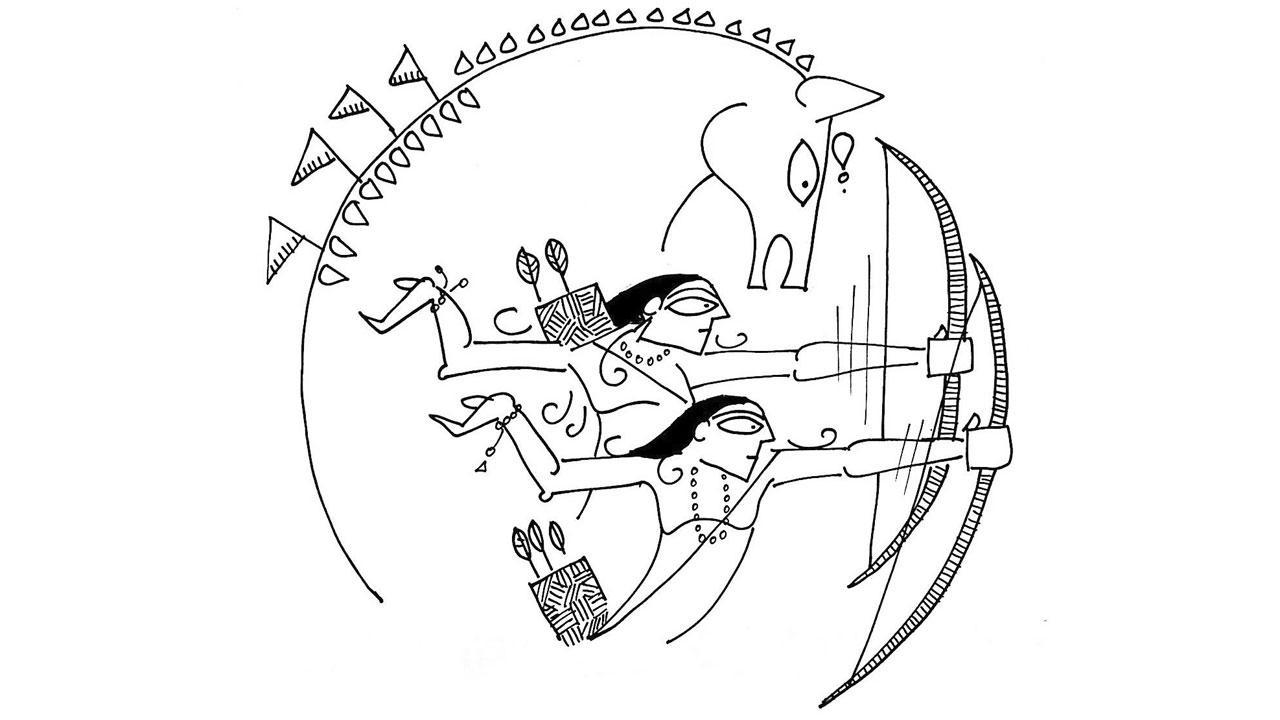A classic case is the story of Oedipus who kills his father and marries his mother. Another story is of Zeus killing his father Chronus, the Titan.

Illustration/Devdutt Pattanaik
 A recurring theme in Greek mythology is of sons killing their fathers. The story begins with a father being told by an oracle that he will be killed by his son. The son is abandoned, but the son survives and returns and eventually kills the father. A classic case is the story of Oedipus who kills his father and marries his mother. Another story is of Zeus killing his father Chronus, the Titan.
A recurring theme in Greek mythology is of sons killing their fathers. The story begins with a father being told by an oracle that he will be killed by his son. The son is abandoned, but the son survives and returns and eventually kills the father. A classic case is the story of Oedipus who kills his father and marries his mother. Another story is of Zeus killing his father Chronus, the Titan.
ADVERTISEMENT
In contrast, Indian tales are famous, where the fathers overpower their sons. The older generation triumphs over the younger generations. Bhisma surrendering his conjugal rights for the sake of his father Shantanu, and Puru surrendering his youth to his father Yayati, are cases in point. In Ramayana, Ram defers to his father’s wishes, gives up his claim to the kingdom and goes to the forest. In the Mahabharata, Arjun asks his son Aravan to offer himself as sacrifice to enable victory in war.
However, this is not entirely true. There are many Indian stories where we find sons overpowering their fathers or father figures. The most famous being Krishna’s lore, where Krishna overpowers his maternal uncle Kansa. Krishna kills him and liberates Mathura from the oppression of this king. In the Ramayana, Ram fights two children who steal the royal horse. They turn out to be Luv and Kush, his own sons raised in the forest by their mother, Sita. Contrast this with Ravana’s son, Indrajit, and other sons, fighting and dying for their father.
In the Adbhuta Ramayana, we hear the story of Hanuman fighting Makaradhwaja, at the gates of Patal. Makaradhwaja turns out to be his son, born when a drop of Hanuman’s sweat fell in the ocean and was consumed by a fish. Vyasa’s Mahabharta talks about Arjun, fighting and being defeated by his son Babruvahana, whose mother is Chitrangadha, princess of Manipur.
The stories of sons defeating fathers, ie, the younger generation defying the older generation, may have entered Indian thought following India’s exposure to the Yavanas of the Indo Greek Kingdom, who ruled much of Northwest India over 2,100 years ago. We know that the Greeks were very influenced by India’s Bhagavad cult, and they worshipped Vrishni heroes, including Krishna, which perhaps explains the stories.
We never hear similar stories of mothers and daughters. In Ramayana, we rarely hear about Sita’s foster mother. We only remember she is the earth’s daughter when she returns to the bowels of the earth after being abandoned by Ram. In Mahabharat, Draupadi does not have a mother. Sons always listen to mothers. The Pandava brothers share a common wife because their mother, Kunti, asks them to. Gandhari uses her magic powers to make her son, Duryodhan, invulnerable to weapons. There is no rivalry with mothers. Intergenerational tension is expressed through fathers and sons. Progressive societies value sons over fathers. Static societies value fathers over sons.
Progress, like evolution, are teleological terms. It assumes ideas of the next generation are better than ideas that existed before. This is the foundation of Western philosophy and religion. This is why the Bible has Old and New Testaments. But Indian thoughts have longer timelines. The idea is the son may bring technological advancements, but emotionally he is the same as his father. Material progress is not spiritual progress. Spiritual progress brings you back to the origin—where there is no conflict, only peace.
The author writes and lectures on the relevance of mythology in modern times. Reach him at devdutt.pattanaik@mid-day.com
 Subscribe today by clicking the link and stay updated with the latest news!" Click here!
Subscribe today by clicking the link and stay updated with the latest news!" Click here!








